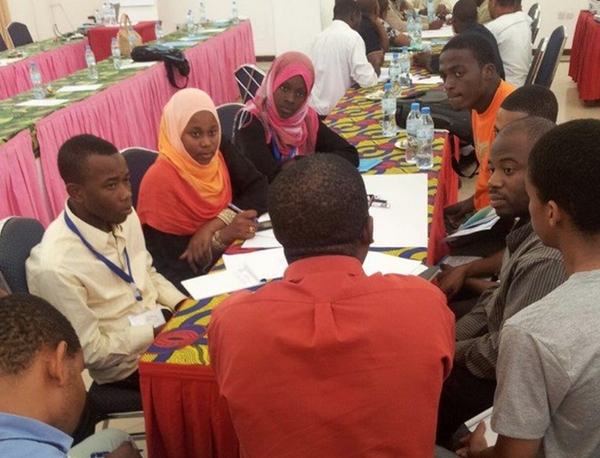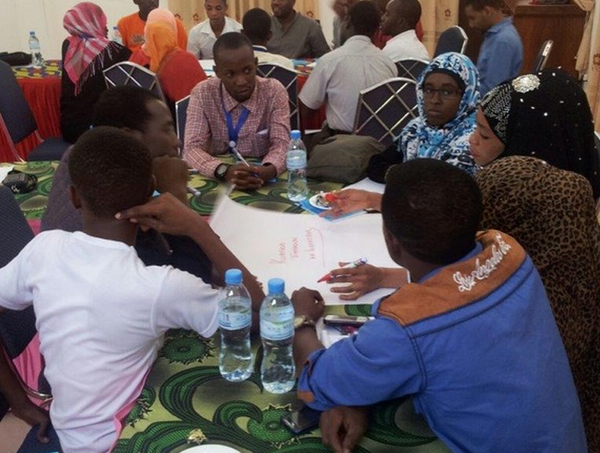The following is the final of three blogs written by members of the ACTION Support Centre and the Centre for Trust, Peace and Social Relations, Coventry University, in which they reflect on the early engagements of their research project funded by Making All Voices Count.
Communal relations in Zanzibar
In September 2014, ACTION Support Centre and Centre for Trust, Peace, and Social Relations (CRPSR) staff were in Zanzibar, working with ZANZIC, who over the last few years have done inspiring conflict prevention work with the Joint Committee of Religious Leaders, the Youth Interfaith Organisation of Zanzibar (YIFOZA) and a youth drama club that promotes interfaith football games and music video-based campaigns of their activities. The research team agreed from the outset that the workshop, and the various meetings that preceded it, would be highly participatory. The research team would not try to lead discussions, but instead allow respondents the space to speak freely about important issues dealing with violence, conflict and security.
In addition to meeting with the police, other NGOs, and participants in ZANZIC’s activities, we conducted a workshop attended by roughly 45 participants. The workshop used conflict transformation analysis tools and a process focused approach to dialogue that sought to elicit the views of all participants.
The participants included a range of local demographics: women, youth, faith leaders and religious minorities were well represented. Two officers from the Community Policing department were also present. This workshop was notable for several factors, which deserve closer examination. Women, even young women, felt able to stand up in front of the whole hall and speak on sometimes highly sensitive issues. It was obvious that their voices were being listened to, and not just because the men were being polite. When working in breakout groups, women again contributed to discussions and were not excluded or belittled. Young women chose to work with young men, and a man chose to join the women’s group and was warmly received.
The police presence at the workshop was welcomed by participants and not resented, despite the fact that lack of trust between communities and police was one of the issues raised during the day. It was very gratifying to witness this endeavour at a new style of policing being welcomed by local people, and several participants said how pleased they were that the police station had sent two officers.
In a society characterised by hierarchy and status, it was interesting to see the important role that young people had in the workshop. Older and senior participants did not dominate the proceedings, even in group work. There seemed to be consensus that young people represent Zanzibar’s future and their attendance at events like this is a welcome step in helping reduce extremism and violence.
As inspiring as the diversity of participants was, it is important to note that each was invited, each came, and each participated out of an established relationship with the Zanzibar Interfaith Centre. Trust has been established over many months, if not years, which contributed significantly to the candid sharing and meaningful communication.
Reflections
Concepts and phrases such as ‘conflict prevention’, ‘conflict transformation’ or ‘early warning’ have little resonance with most Zanzibari people. Instead, issues of political violence, crime and personal safety are conflated into what we would term concern over ‘human security’. Child abuse, the effect of shifting traditions and cultures, unemployment, and general safety were articulated as significant concerns.
We observed that participants tended not to clearly distinguish different aspects of responding to conflict. Instead, they articulated a framework that emphasises how different ‘agents’ communicate and coordinate, how they trust each other, and how they are networked. What became evident during our fieldwork in Zanzibar was that the labels and frameworks used in the overarching discourse on Early Warning/Early Response and innovations in ICTs are not adequate or inclusive enough to capture the realities of what local people understand and believe.
Workshop survey on communication tools
During the workshop, we conducted an anonymous, multiple-choice survey to investigate the existing communications usage and preferences. Participants were asked how often they use various communication tools, their age and gender. 32 people completed the survey. Most respondents were in their late twenties or early thirties, and three quarters were men. This could indicate that older participants were less likely to hand in their completed surveys.
Our short survey indicates that the four most commonly used communication tools by the workshop participants are mobile phone, television, SMS, and radio. Most respondents used these tools several times a day. Personal computers were also surprisingly high in the ranking. Internet cafes and landlines were among the three least frequently used.
Though fliers (the third means of communication at the bottom of the list) are infrequently used, previous conversations conveyed how influential they are. In one conversation it was observed that fliers often precede violence, and that a flier is never a good sign. Another influential communications tool that was mentioned was a public board on which xenophobic messages were written, read by commuters walking to and from work every day. These low-tech forms of communication are a critical consideration in understanding escalating tensions and appropriate responses to preventing violence. Media forms with higher rankings in the survey carried out are not necessarily more important or influential in communicating messages than those with lower rankings.
Closing thoughts
It is clear that the groundwork done by ZANZIC over the last few years is a major factor in the success of the workshop and similar community events. Without their outreach activities and the inter-group relations that have been built up, the workshop would have been poorly attended and much less illuminating.
For outsiders, the levels of trust and openness apparent in the workshop were palpable. The relationships between diverse stakeholders that were built and strengthened appear to be important. However, we recognise that the participants may not be representative of Zanzibar as a whole. The key issue therefore, seems to be how to promote and broaden this dynamic of inter-communal trust so it becomes more of a ‘norm’ in the society, contributing to a deeper culture of dialogue and relationship building.
As strong relationships and a norm of dialogue develop it is more likely that concerned or angry community members will approach their Mufti, who in turn will know the clergy well enough to call them, and who will have enough trust to listen to and hear the Mufti, and take the steps necessary to communicate effectively with their own constituencies. Representative leadership that is connected across differences and communicating clearly and effectively can more easily begin to build a culture that can prevent violence and promote respect and peaceful coexistence.
Read the first blog here and the second blog here.
About the author
Steven Leach and Richard Smith from the ACTION Support Centre (ASC) together with Chas Morrison and Laura Payne of the Centre for Trust, Peace and Social Relations, Coventry University.Related content
-
BLOG | January 14, 2015
Can ICT innovation adequately support conflict prevention? -
BLOG | January 7, 2015
Technology, communications and conflict prevention in Zanzibar -
PROJECT | August 12, 2015
Preventing violence through community-level monitoring -
PUBLICATION | August 23, 2016
Engaging with local communities to prevent violence: what role for…

